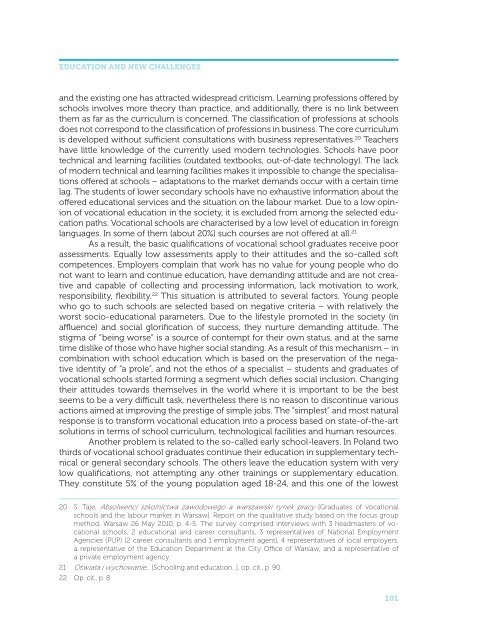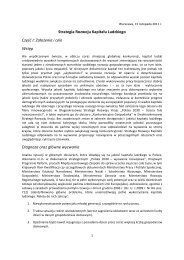Education and new challenges - Raport Polska 2030
Education and new challenges - Raport Polska 2030
Education and new challenges - Raport Polska 2030
Create successful ePaper yourself
Turn your PDF publications into a flip-book with our unique Google optimized e-Paper software.
<strong>Education</strong> <strong>and</strong> <strong>new</strong> <strong>challenges</strong><br />
<strong>and</strong> the existing one has attracted widespread criticism. Learning professions offered by<br />
schools involves more theory than practice, <strong>and</strong> additionally, there is no link between<br />
them as far as the curriculum is concerned. The classification of professions at schools<br />
does not correspond to the classification of professions in business. The core curriculum<br />
is developed without sufficient consultations with business representatives. 20 Teachers<br />
have little knowledge of the currently used modern technologies. Schools have poor<br />
technical <strong>and</strong> learning facilities (outdated textbooks, out-of-date technology). The lack<br />
of modern technical <strong>and</strong> learning facilities makes it impossible to change the specialisations<br />
offered at schools – adaptations to the market dem<strong>and</strong>s occur with a certain time<br />
lag. The students of lower secondary schools have no exhaustive information about the<br />
offered educational services <strong>and</strong> the situation on the labour market. Due to a low opinion<br />
of vocational education in the society, it is excluded from among the selected education<br />
paths. Vocational schools are characterised by a low level of education in foreign<br />
languages. In some of them (about 20%) such courses are not offered at all. 21<br />
As a result, the basic qualifications of vocational school graduates receive poor<br />
assessments. Equally low assessments apply to their attitudes <strong>and</strong> the so-called soft<br />
competences. Employers complain that work has no value for young people who do<br />
not want to learn <strong>and</strong> continue education, have dem<strong>and</strong>ing attitude <strong>and</strong> are not creative<br />
<strong>and</strong> capable of collecting <strong>and</strong> processing information, lack motivation to work,<br />
responsibility, flexibility. 22 This situation is attributed to several factors. Young people<br />
who go to such schools are selected based on negative criteria – with relatively the<br />
worst socio-educational parameters. Due to the lifestyle promoted in the society (in<br />
affluence) <strong>and</strong> social glorification of success, they nurture dem<strong>and</strong>ing attitude. The<br />
stigma of “being worse” is a source of contempt for their own status, <strong>and</strong> at the same<br />
time dislike of those who have higher social st<strong>and</strong>ing. As a result of this mechanism – in<br />
combination with school education which is based on the preservation of the negative<br />
identity of “a prole”, <strong>and</strong> not the ethos of a specialist – students <strong>and</strong> graduates of<br />
vocational schools started forming a segment which defies social inclusion. Changing<br />
their attitudes towards themselves in the world where it is important to be the best<br />
seems to be a very difficult task, nevertheless there is no reason to discontinue various<br />
actions aimed at improving the prestige of simple jobs. The “simplest” <strong>and</strong> most natural<br />
response is to transform vocational education into a process based on state-of-the-art<br />
solutions in terms of school curriculum, technological facilities <strong>and</strong> human resources.<br />
Another problem is related to the so-called early school-leavers. In Pol<strong>and</strong> two<br />
thirds of vocational school graduates continue their education in supplementary technical<br />
or general secondary schools. The others leave the education system with very<br />
low qualifications, not attempting any other trainings or supplementary education.<br />
They constitute 5% of the young population aged 18-24, <strong>and</strong> this one of the lowest<br />
20 S. Taje, Absolwenci szkolnictwa zawodowego a warszawski rynek pracy [Graduates of vocational<br />
schools <strong>and</strong> the labour market in Warsaw]. Report on the qualitative study based on the focus group<br />
method, Warsaw 26 May 2010, p. 4-5. The survey comprised interviews with 3 headmasters of vocational<br />
schools, 2 educational <strong>and</strong> career consultants, 3 representatives of National Employment<br />
Agencies (PUP) (2 career consultants <strong>and</strong> 1 employment agent), 4 representatives of local employers,<br />
a representative of the <strong>Education</strong> Department at the City Office of Warsaw, <strong>and</strong> a representative of<br />
a private employment agency.<br />
21 Oświata i wychowanie... [Schooling <strong>and</strong> education...], op. cit., p. 90.<br />
22 Op. cit., p. 8.<br />
101







